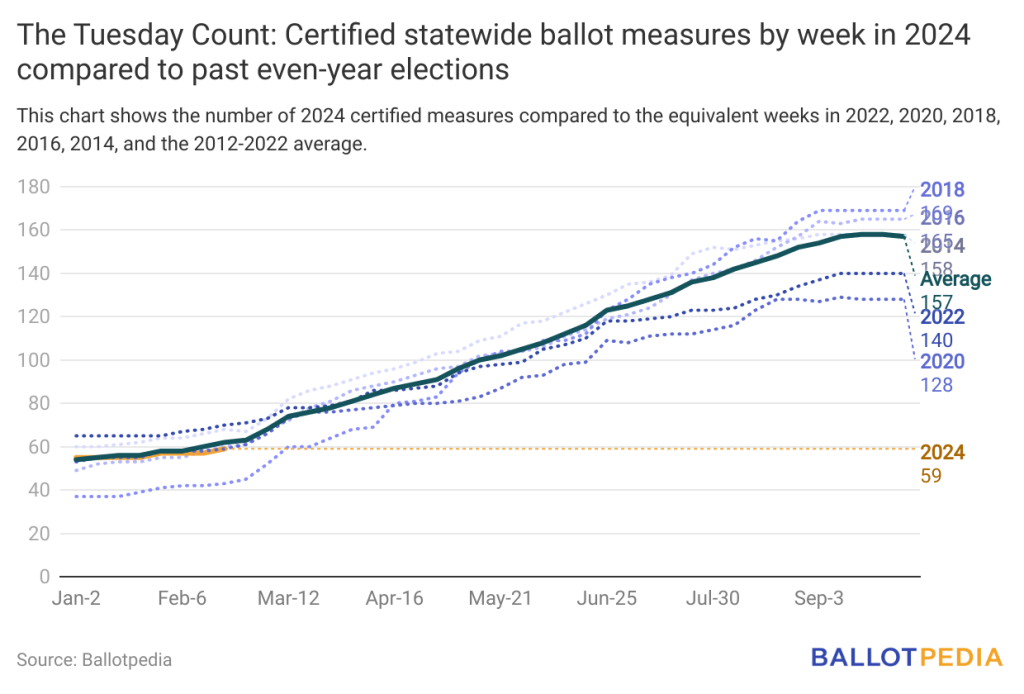For 2024, 59 statewide ballot measures have been certified for the ballot in 25 states, which is three less than the average (62) for this point in the election cycle from 2012 to 2022. The average number of statewide ballot measures certified for an even-numbered year during this period was 157.
Here’s an update on the latest ballot measure activity:
Two more constitutional amendments were certified for the ballot in New Mexico:
Signatures have been submitted and are pending verification or another pre-certification action for four initiatives in Alaska, Maine, and Michigan:
- Alaska Minimum Wage Increase and Paid Sick Leave Initiative
- Alaska Repeal Top-Four Ranked-Choice Voting Initiative
- Maine Campaign Contribution Limits Initiative
- Michigan $15 Minimum Wage Initiative
In Massachusetts and Washington, enough signatures were verified for 12 indirect ballot initiatives for them to appear before their respective state legislatures:
- Massachusetts App-Based Drivers as Contractors and Labor Policies Initiative
- Massachusetts Authorization of State Auditor to Audit General Court Initiative
- Massachusetts Minimum Wage for Tipped Employees Initiative
- Massachusetts Regulated Access to Psychedelic Substances Initiative
- Massachusetts Repeal Competency Assessment Requirement for High School Graduation Initiative
- Massachusetts Unionization and Collective Bargaining for Transportation Network Drivers Initiative
- Washington Initiative 2081, Parental Right to Review Education Materials, Receive Notifications, and Opt Out of Sexual-Health Education Initiative
- Washington Initiative 2109, Repeal Capital Gains Tax Initiative
- Washington Initiative 2111, Prohibit Income Taxes Initiative
- Washington Initiative 2113, Police Vehicular Pursuits Initiative
- Washington Initiative 2117, Repeal Carbon Cap and Invest Program Measure
- Washington Initiative 2124, Opt-Out of Long-Term Services Insurance Program Initiative
In Alaska, Maine, and Michigan, initiated state statutes are indirect or follow a similar process. This means the legislature has the option to pass the initiative outright. Legislators have a certain number of days, depending on the state, to adopt the initiative into law. In Maine and Michigan, when legislators take no action or reject the initiative, the initiative is put on the ballot for voters to decide. In Alaska, the initiative is not automatically introduced into the legislature, but legislators can pass a substantively similar bill by the end of the session, which renders the initiative void. In Massachusetts, petitioners collect a second round of signatures to place the initiative on the ballot.
The most recent signature deadline for citizen-initiated ballot measures was Feb. 15, 2024, in Utah, where signatures were filed for one initiative. However, the number of signatures filed was below the requirement.
The next signature deadline is May 1, 2024, in Idaho, where two ballot initiatives have been proposed—one to legalize medical marijuana, and another to create a top-four ranked-choice voting (RCV) system.
The following chart shows the number of ballot measures certified across each week of an even-numbered year.

Additional:







